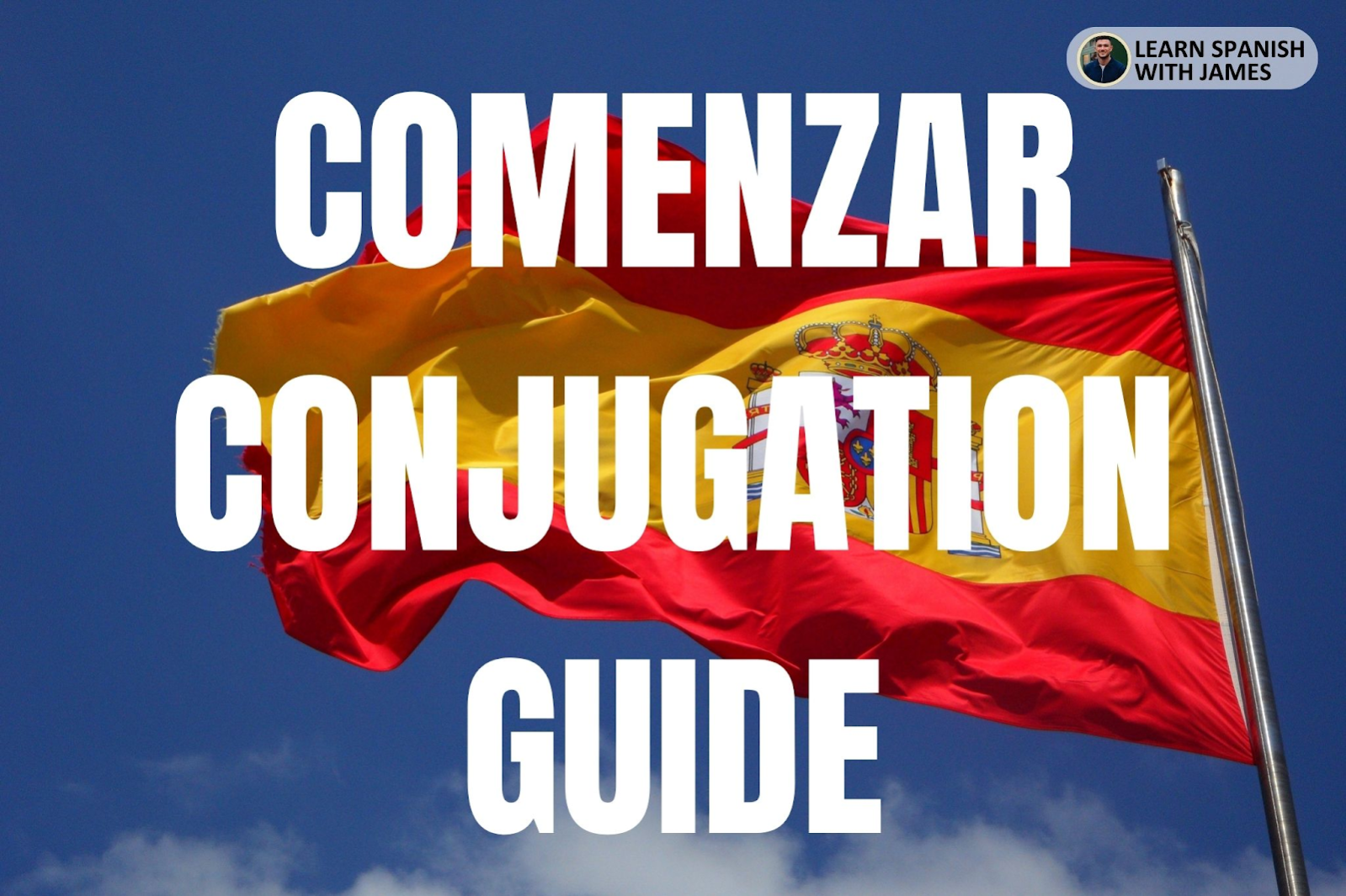Comenzar Conjugation Chart & Full Tense Guide

“Comenzar” means “to start” or “to begin”.
As a regular verb, conjugating “comenzar” follows typical patterns, just as other similar Spanish verbs from the -ar group.
I’m James, from Learn Spanish With James, and the host of the Learn Spanish With James Podcast.
In this guide, you’ll find a“comenzar” conjugation verb chart for each tense, with examples across simple and compound tenses, as well as the subjunctive and imperative mood.
By the end of this guide, you will know every ”comenzar” conjugation in Spanish and how to use it in everyday conversations in Spain or Latin America.
Present Tense
Pronouns Pronombres Conjugation
I yo comienzo
you tú comienzas
he,she,it, you(formal) él,ella,usted comienza
we nosotros,nosotras comenzamos
you pl. vosotros, vosotras comenzáis
they, you pl. (formal) ellos,ellas,ustedes comienzan
When We Use the Present Tense
The present tense is typically used to denote actions happening currently or habitual actions.
Sometimes, the Spanish verb “comenzar” can also be used in the present simple tense to express an idea of something about to begin in the near future.
Examples of each “comenzar” conjugation in the present tense are below.
Examples of the Spanish Verb Comenzar in the Present Tense
- Yo comienzo mi tarea ahora. (I am starting my homework now.)
- Tú comienzas a estudiar español esta semana. (You start studying Spanish this week.)
- Él/Ella/Usted comienza su nuevo trabajo mañana. (He/She starts his/her new job tomorrow.)
- Nosotros comenzamos la reunión a las 9 de la mañana. (We start the meeting at 9 in the morning.)
- Vosotros comenzáis a aprender a bailar salsa. (You all start learning to dance salsa.)
- Ellos/Ellas comienzan a leer un libro interesante. (They start reading an interesting book.)
Preterite Tense
Pronouns Pronombres Conjugation
I yo comencé
you tú comenzaste
he, she. it, you (formal) él, ella, usted comenzó
we nosotros, nosotras comenzamos
you (plural) vosotros, vosotras comenzasteis
they, you (pl. formal) ellos, ellas, ustedes comenzaron
When We Use the Preterite Tense
The preterite tense signifies actions completed in the past, often with a completed end point.
This differs from the imperfect tense, which describes that something was ongoing or used to occur. I highlight the differences between these tenses in this guide to Spanish verb tenses.
Examples of Comenzar in the Preterite Tense
- Yo comencé a correr ayer. (I started running yesterday.)
- Tú comenzaste la película anoche. (You started the movie last night.)
- Él/Ella/Usted comenzó su viaje la semana pasada. (He/She started his/her trip last week.)
- Nosotros comenzamos la fiesta a tiempo. (We started the party on time.)
- Vosotros comenzasteis a seguir las noticias el mes pasado. (You all started following the news last month.)
- Ellos/Ellas comenzaron a trabajar temprano. (They started working early.)
Imperfect Tense
Pronouns Pronombres Conjugation
I yo comenzaba
you tú comenzabas
he, she, it, you (formal) él, ella, usted comenzaba
we nosotros, nosotras comenzábamos
you (plural) vosotros, vosotras comenzabais
they, you(pl. formal) ellos, ellas, ustedes comenzaban
When We Use the Imperfect Tense
The imperfect verb conjugation describes ongoing or habitual past actions.
For example, “I was starting” or “I used to start“.
This past tense is often used to give background information and set the scene or talk about a past habit.
Examples of Comenzar in the Imperfect Tense
- Yo comenzaba a estudiar a las 8 de la noche. (I used to start studying at 8 in the evening.)
- Tú comenzabas a dibujar cuando eras niño. (You used to start drawing when you were a child.)
- Él/Ella/Usted comenzaba a cantar en el coro todos los sábados. (He/She used to start singing in the choir every Saturday.)
- Nosotros comenzábamos a caminar por el parque cada mañana. Nos lo pasábamos super bien. (We used to start walking in the park every morning. We had a great time)
Note: “Pasarlo bien” is a fixed phrase and “pasábamos is a “pasar” conjugation in the imperfect tense. - Vosotros comenzabais a jugar fútbol después de la escuela. (You all used to start playing soccer after school.)
- Ellos/Ellas comenzaban a trabajar en el jardín durante el verano. (They used to start working in the garden during the summer.)
Future Tense
Pronouns Pronombres Conjugation
I yo comenzaré
you tú comenzarás
he,she,it, you(formal) él,ella,usted comenzará
we nosotros,nosotras comenzaremos
you pl. vosotros, vosotras comenzaréis
they, you pl. (formal) ellos,ellas,ustedes comenzarán
When We Use the Future Tense
The future tense indicates actions that will occur in the future.
So, each ”comenzar” conjugation in the future tense describes plans or intentions of someone starting something in the near future.
Examples of Comenzar in the Future Tense
- Yo comenzaré a estudiar medicina el próximo año. (I will start studying medicine next year.)
- Tú comenzarás a trabajar en tu nuevo proyecto la próxima semana. (You will start working on your new project next week.)
- Él/Ella comenzará a ahorrar dinero para su viaje. (He/She will start saving money for his/her trip.)
- Nosotros comenzaremos a construir nuestra casa en primavera. (We will start building our house in spring.)
- Vosotros comenzaréis a planificar vuestras vacaciones de verano. (You all will start planning your summer vacation.)
- Ellos/Ellas comenzarán a escribir su libro pronto. (They will start writing their book soon.)
Conditional Tense
Pronouns Pronombres Conjugation
I yo comenzaría
you tú comenzarías
he,she,it, you(formal) él,ella,usted comenzaría
we nosotros,nosotras comenzaríamos
you pl. vosotros, vosotras comenzaríais
they, you pl. (formal) ellos,ellas,ustedes comenzarían
When We Use the Conditional Tense
The conditional tense expresses actions that would occur under certain conditions or in hypothetical situations.
My Top Tip: 🔥 Learn how to use the conditional tense + imperfect subjunctive tense ASAP! It will help you score big marks in your speaking or writing exams.
Examples of Comenzar in the Conditional Tense
- Yo comenzaría una dieta si tuviera más tiempo. (I would start a diet if I had more time.)
- Tú comenzarías un negocio si tuvieras el capital necesario. (You would start a business if you had the necessary capital.)
- Él/Ella comenzaría a viajar por el mundo si pudiera. (He/She would start traveling the world if he/she could.)
Note: “pudiera” is a “poder” conjugation in the imperfect subjunctive form. - Nosotros comenzaríamos a estudiar música si tuviéramos un piano. (We would start studying music if we had a piano.)
Note: “tuviéramos” is a “tener” conjugation in the imperfect subjunctive form. - Vosotros comenzaríais a aprender un nuevo idioma si tuvierais la oportunidad. (You all would start learning a new language if you had the opportunity.)
- Ellos/Ellas comenzarían a trabajar en el proyecto si les ofrecieran más recursos. (They would start working on the project if they were offered more resources.)
Note: “ofrecieran” is an “ofrecer” conjugation in the imperfect subjunctive form.
Preterite Perfect Tense
Pronouns Pronombres Auxiliary verb ‘haber’ Past Participle
I yo he comenzado
you tú has comenzado
he,she,it, you(formal) él,ella,usted ha comenzado
we nosotros,nosotras hemos comenzado
you pl. vosotros, vosotras habéis comenzado
they, you pl. (formal) ellos,ellas,ustedes han comenzado
When We Use the Preterite Perfect Tense
The preterite perfect tense, also referred to simply as the perfect tense, indicates actions that have been completed before a specific point in the past.
So, this tense emphasizes the completion of the action and its relevance to a past context.
We form the perfect tense with the auxiliary verb ”haber” and the past participle “comenzado.”
Note: 🔥 All -AR verbs take the -ado past participle, while -ir and -er verbs take the -ido ending.
Examples are as follows: “Yo había comenzado a estudiar antes de la prueba.” (I had started studying before the test.) Or, “Todavia no has comenzado tú la escuela?” (You haven’t started school yet?).
Examples of Comenzar in the Preterite Perfect Tense
- Yo he comenzado a leer el libro que me recomendaste. (I have started reading the book you recommended.)
- Tú has comenzado a hacer ejercicio regularmente. (You have started exercising regularly.)
- Él/Ella ha comenzado a aprender a tocar el piano. (He/She has started learning to play the piano.)
- Nosotros hemos comenzado a encontrar con el alcalde todos los días. (We have started meeting with the mayor every day.)
- Vosotros habéis comenzado a cocinar juntos recientemente. (You all have started cooking together recently.)
- Ellos/Ellas han comenzado a estudiar español este año. (They have started studying Spanish this year.)
Pluperfect Tense
Pronouns Pronombres Auxiliary verb ‘haber’ Past Participle
I yo había comenzado
you tú habías comenzado
he,she,it, you(formal) él,ella,usted había comenzado
we nosotros,nosotras habíamos comenzado
you pl. vosotros, vosotras habíais comenzado
they, you pl. (formal) ellos,ellas,ustedes habían comenzado
When We Use the Pluperfect Tense
The pluperfect tense describes actions that had been completed before another past action, similar to the past perfect in English.
It is also formed with the conjugated forms of the auxiliary verb ”haber” and the past participle “comenzado.”
Each “comenzar” conjugation in this form can be seen below. But really, you’re conjugating “haber” first, as the past participle always stays the same.
Examples of Comenzar in the Pluperfect Tense
- Yo había comenzado a preparar la cena cuando llegaste. (I had started preparing dinner when you arrived.)
- Tú habías comenzado a trabajar antes de que yo llegara. (You had started working before I arrived.)
Note: “llegara” is a “llegar” conjugation in the imperfect subjunctive form. - Él/Ella había comenzado a escribir su informe antes de la reunión. (He/She had started writing his/her report before the meeting.)
- Nosotros habíamos comenzado a estudiar antes de que empezara la lluvia. (We had started studying before the rain started.)
- Vosotros habíais comenzado a construir la casa antes del invierno. (You all had started building the house before winter.)
- Ellos/Ellas habían comenzado a practicar deportes desde muy jóvenes. (They had started practicing sports since they were very young.)
Future Perfect Tense
Pronouns Pronombres Auxiliary verb ‘haber’ Past Participle
I yo habré comenzado
you tú habrás comenzado
he,she,it, you(formal) él,ella,usted habrá comenzado
we nosotros,nosotras habremos comenzado
you pl. vosotros, vosotras habréis comenzado
they, you pl. (formal) ellos,ellas,ustedes habrán comenzado
When We Use the Future Perfect Tense
The future perfect tense indicates actions that will have been completed by a certain point in the future.
Again, using this tense requires the auxiliary verb ”haber” and the past participle “comenzado.”
Examples of Comenzar in the Future Perfect Tense
- Yo habré comenzado mi carrera universitaria para el próximo año. (I will have started my college career by next year.)
- Tú habrás comenzado tu proyecto de investigación antes de graduarte. (You will have started your research project before graduating.)
- Él/Ella habrá comenzado su nuevo empleo para fines de este mes. (He/She will have started his/her new job by the end of this month.)
- Nosotros habremos comenzado la construcción del edificio para el próximo trimestre. (We will have started the building construction by next quarter.)
- Vosotros habréis comenzado vuestras vacaciones antes de que lleguen tus padres. (You all will have started your vacation before your parents arrive.)
- Ellos/Ellas habrán comenzado su entrenamiento antes de la competencia. (They will have started their training before the competition.)
Conditional Perfect Tense
Pronouns Pronombres Auxiliary verb ‘haber’ Past Participle
I yo habría comenzado
you tú habrías comenzado
he,she,it, you(formal) él,ella,usted habría comenzado
we nosotros,nosotras habríamos comenzado
you pl. vosotros, vosotras habríais comenzado
they, you pl. (formal) ellos,ellas,ustedes habrían comenzado
When We Use the Conditional Perfect Tense
The conditional perfect tense is employed to express actions that would have been completed under certain conditions in the past.
This tense emphasizes the hypothetical nature of the action, indicating what would have started given a particular circumstance or condition.
For example: “Habría comenzado el proyecto si hubiera tenido más tiempo.” (I would have started the project if I had had more time.)
Examples of Comenzar in the Conditional Perfect Tense
- Yo habría comenzado la dieta si hubiera tenido más tiempo. (I would have started the diet if I had had more time.)
- Tú habrías comenzado el negocio si hubieras tenido el capital necesario. (You would have started the business if you had had the necessary capital.)
- Él/Ella habría comenzado a viajar por el mundo si hubiera tenido la oportunidad. (He/She would have started traveling the world if he/she had had the opportunity.)
- Nosotros habríamos comenzado a estudiar música si hubiéramos tenido un piano. (We would have started studying music if we had had a piano.)
- Vosotros habríais comenzado a aprender un nuevo idioma si hubierais tenido la oportunidad. (You all would have started learning a new language if you had had the opportunity.)
- Ellos/Ellas habrían comenzado a trabajar en el proyecto si les hubieran ofrecido más recursos. (They would have started working on the project if they had been offered more resources.)
Present Subjunctive
Pronouns Pronombres Conjugation
I yo comience
you tú comiences
he,she,it, you(formal) él,ella,usted comience
we nosotros,nosotras comencemos
you pl. vosotros, vosotras comencéis
they, you pl. (formal) ellos,ellas,ustedes comiencen
When We Use the Present Subjunctive
The present subjunctive mood is used to express desires, doubts, or uncertain actions in the present or future.
Examples of Comenzar in the Present Subjunctive
- Es importante que yo comience a practicar todos los días. (It’s important that I start practicing every day.)
- Quiero que tú comiences a ahorrar dinero. (I want you to start saving money.)
- Dudo que él/ella comience a entender el problema. (I doubt he/she will start understanding the problem.)
- Ojalá que nosotros comencemos a ver resultados pronto. (I hope we start seeing results soon.)
- Recomiendo que vosotros comencéis a buscar trabajo ahora mismo. (I recommend you start looking for a job right away.)
- Es necesario que ellos/ellas comiencen a colaborar más en equipo. (It’s necessary for them to start collaborating more as a team.)
Imperfect Subjunctive
Pronouns Pronombres Conjugation
I yo comenzara, comenzase
you tú comenzaras, comenzases
he,she,it, you(formal) él,ella,usted comenzara, comenzase
we nosotros,nosotras comenzáramos, comenzásemos
you pl. vosotros, vosotras comenzarais, comenzaseis
they, you pl. (formal) ellos,ellas,ustedes comenzaran, comenzasen
When We Use the Imperfect Subjunctive
The imperfect subjunctive is used to express hypothetical or uncertain actions in the past.
Examples of Comenzar in the Imperfect Subjunctive
- Prefería que yo comenzara a estudiar temprano. (I preferred that I started studying early.)
- Yo prefería que tú comenzaras a estudiar temprano. (I preferred that you started studying early.)
- Era importante que él/ella comenzara a practicar deporte regularmente. (It was important that he/she started practicing sports regularly.)
Note: “era” is a “ser” conjugation in the imperfect tense. - Queríamos que nosotros comenzáramos a trabajar juntos en el proyecto. (We wanted us to start working together on the project.)
Note: “queríamos” is a “querer” conjugation in the imperfect tense. - Me gustaría que vosotros comenzarais a ayudar en casa más a menudo. (I would like you to start helping at home more often.)
- Era necesario que ellos/ellas comenzaran a llegar a tiempo a las reuniones. (It was necessary for them to start arriving on time for meetings.)
Affirmative Imperative
Pronouns Pronombres Conjugation
you tú ¡comienza!
he,she,it, you(formal) él,ella,usted ¡comience!
we nosotros,nosotras ¡comencemos!
you pl. vosotros, vosotras ¡comenzad!
they, you pl. (formal) ellos,ellas,ustedes ¡comiencen!
When We Use The Affirmative Imperative
The affirmative imperative is used to give commands or instructions in a positive form. We only really use this in Spanish to direct someone to perform an action.
Do you notice the change between the ‘z’ and the ‘c’ below? The pronunciation of these letters stays the same.
Examples of Comenzar in the Affirmative Imperative
- ¡Comienza el proyecto ahora mismo! (Start the project right now!)
- ¡Comenzad a estudiar para el examen. (Start studying for the exam.)
- ¡Comience a trabajar en el informe de inmediato! (Start working on the report immediately!)
- ¡Comencemos la reunión sin más demora. (Let’s start the meeting without further delay.)
- ¡Comiencen a correr para calentar! (Start running to warm up!)
Negative Imperative
Pronouns Pronombres Conjugation
you tú ¡no comiences!
he,she,it, you(formal) él,ella,usted ¡no comience!
we nosotros,nosotras ¡no comencemos!
you pl. vosotros, vosotras ¡no comencéis!
they, you pl. (formal) ellos,ellas,ustedes ¡no comiencen!
When We Use The Negative Imperative
We use the negative imperative when we want to forbid or prohibit someone from performing an action.
To construct each “comenzar” conjugation in this form, we use “no” and take the present subjunctive endings.
Examples of Comenzar in the Negative Imperative
- ¡No comiences sin mi autorización! (Don’t start without my permission!)
- ¡No comencéis a jugar hasta que terminéis vuestros deberes. (Don’t start playing until you finish your homework.)
- ¡No comience a comer hasta que todos estén sentados! (Don’t start eating until everyone is seated!)
- ¡No comencemos la película hasta que lleguen todos. (Let’s not start the movie until everyone arrives.)
- ¡No comiencen a hablar hasta que el profesor les dé permiso! (Don’t start talking until the teacher gives you permission!)
Online Spanish Courses & Grammar Courses
I hope you found this “comenzar” conjugation guide helpful.
For a full list of Beginner, Intermediate and Advanced Courses, check out this full list of online Spanish courses.
I put this list together myself, and it comprises a mixture of courses that offer Spanish grammar practice for all levels, conversational practice, listening and writing exercises in Spanish, free Spanish courses, and a whole lot more.
The fastest way to learn Spanish is to test a mixture of Spanish resources and choose the course that coincides most with your learning style.
In addition to online Spanish courses, on this site you will find a wide range of Spanish podcasts, Spanish apps, Spanish YouTube channels, and both online and physical Spanish language schools.

About James – Or Should that be Santiago?
My name is James. I am a Brit with a love for the Spanish language. I have lived in Spain, Argentina, and Costa Rica, and I have been teaching Spanish for over a decade. This site will show you how to master the elements of Spanish grammar that often dishearten learners. I hope you enjoy the site and find it useful.
If you are interested in taking your Spanish to the next level, check out the Courses section for a full list of the Spanish courses I suggest. All reviews are based on my personal opinions.







